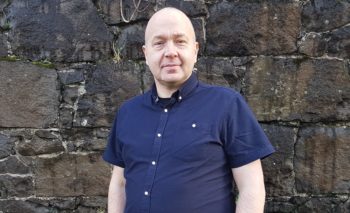
Non-religious pastoral carers have entered a Northern Ireland prison for the first time, clocking up more than 100 humanist pastoral care visits to non-religious prisoners in the first six months of the programme.
Earlier this year, Northern Ireland Humanists, which is part of Humanists UK, recruited two trained non-religious pastoral carers and supported them to enter Maghaberry Prison, which until this year had only provided religious chaplaincy to prisoners.
Maghaberry is a high-security prison and houses loyalist and republican paramilitary affiliations who are held in separate accommodation. And it was previously regarded as ‘the most dangerous prison in the UK.’
The two humanist volunteer pastoral carers, one of whom is Ciaran McWilliams, conduct several weekly visits to prisoners on remand and in solitary confinement who self-identify as agnostic, atheist, humanist or simply non-religious.
Humanist pastoral carers are trained in listening skills, empathy, and ethics, and provide prisoners with bereavement support and the ear of a like-minded person who understands their worldview. According to 2018 data, prisoners who identify as having ‘no religion’ make up the largest population in Maghaberry Prison after Christians.
Non-religious prisoners have legal rights to request and be provided with a humanist pastoral supporter in the same way that religious prisoners have rights to see a religious chaplain.
Humanists UK campaigns for equal access to pastoral care in prisons, hospitals, and the armed forces across the UK, including Northern Ireland. Currently, almost 20% of prisons and 45% of hospitals in England and Wales have a non-religious pastoral carer in their team, including some paid posts, such as Lindsay van Dijk, who last year was appointed the first humanist to lead an NHS Trust’s chaplaincy/pastoral care team. But demand in both settings is much higher.
Commenting on his experiences, Northern Ireland Humanists pastoral carer Ciaran McWilliams said: ‘Every interaction is different, sometimes they just want to share a small grievance, other times they tell us about a traumatic event they suffered in their childhood. But a common theme is remorse, and a desire to change. Many have serious anxiety and PTSD from being in the army or due to their involvement in violent crime. You have to be ready for all of it and most importantly ensure you create a safe space for them as they share these private, difficult emotions.
‘A lot of the conversation does surround what it means to be non-religious; being one of the few rather than the many, and the political identity issues we have in Northern Ireland.
‘We’ve learnt how important it is to create that human connection with them. Some have told us that they have no family or other visitors and we may be the only person they speak to other than their cellmate in a day. Hearing that made us realise how vital our work is, and we have been hugely welcomed by the prison management and staff.’
Northern Ireland Humanists Coordinator Boyd Sleator said: ‘Everyone needs compassion and empathy when going through difficult times, irrespective of one’s beliefs or background, and the value of good pastoral care in prisons and hospitals in promoting good health outcomes is becoming increasingly recognised. However, it is disappointing that this care isn’t always provided on an equal basis to all. Historically in Northern Ireland it has been very challenging to break through traditions to provide this care.
‘Demand for non-religious pastoral care in both prisons and hospitals is growing rapidly as the non-religious population grows. It shows tremendous progress to have the first ever pastoral carers in Maghaberry and we hope it will now be rolled out across more settings.’
Humanists UK trains hundreds of non-religious pastoral carers a year and welcome applications from suitably qualified non-religious people.
NOTES:
For further comment or information, please contact Humanists UK press manager Casey-Ann Seaniger at casey@humanists.uk or phone 020 7324 3078 or 07393 344293.
For more information on Humanists UK’s campaigning on equal provision of chaplaincy and pastoral care work, visit https://humanists.uk/campaigns/human-rights-and-equality/chaplaincy-and-pastoral-support/
For more information on pastoral care, visit http://humanistcare.org.uk/
Northern Ireland Humanists is a part of Humanists UK, working with the Humanist Association of Ireland. Humanists UK is the national charity working on behalf of non-religious people. Powered by over 85,000 members and supporters, we advance free thinking and promote humanism to create a tolerant society where rational thinking and kindness prevail. We provide ceremonies, pastoral care, education, and support services benefitting over a million people every year and our campaigns advance humanist thinking on ethical issues, human rights, and equal treatment for all.
Humanists are non-religious people who shape their own lives in the here and now because we believe it’s the only life we have. They make sense of the world through logic, reason, and evidence, and seek to treat others with kindness, warmth, and respect.
